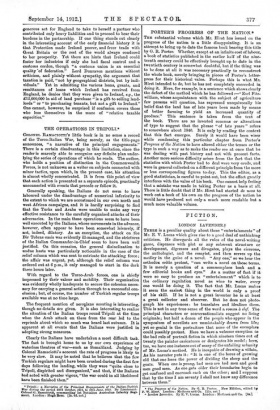THE OPERATIONS IN TRIPOLI.* COLONEL RIMACIOTTI'S little book is in
no sense a record of the Turco-Italian War, being merely, as the title-page announces, "a narrative of the principal engagements." There is a certain disadvantage in this limitation, since the reader is scarcely able to recognize any definite plan under- lying the series of operations of which he reads. The author, who holds a position of distinction in the Commonwealth Forces, is not unknown as a writer on subjects connected with minor tactics, upon which, in the present case, his attention is almost wholly concentrated. It is from this point of view that each action is presented as a separate episode, practically unconnected with events that precede or follow it.
Generally speaking, the Italians do not seem to have laboured under the disadvantage of numerical inferiority to the extent to which we are accustomed in our own north and west African campaigns, and it is hardly surprising to find that the Turks and Arabs were unable to make any very effective resistance to the carefully organized attacks of their adversaries. In the main these operations seem to have been well executed by the Italians, whose movements in the advance, however, often appear to have been somewhat leisurely, if not, indeed, dilatory. As an exception, the attack on the Bir Tobras oasis was evidently ill-managed, and the strictures of the Italian Commander-in-Chief seem to have been well justified. On this occasion, the general disinclination to undue haste was particularly noticeable in the case of the relief column which was sent to extricate the attacking force ; the affair was urgent, yet, although the relief column was ordered out at 6 p.m., it only managed to start in the dark three hours later.
With regard to the Turco-Arab forces, one is chiefly impressed by their valour and mobility. Their organization was evidently wholly inadequate to secure the cohesion neces- sary for carrying a general action through to a successful con- elusion; but, of course, the number of Turkish regular troops available was at no time large.
The frequent mention of aeroplane scouting is interesting, though no details are given. It is also interesting to realize the situation of the Italian troops round Tripoli at the time when the Arab attack on them from the rear led to the reprisals about which so much was heard last autumn. It is apparent at all events that the Italians were justified in adopting strong measures.
Clearly the Italians have undertaken a most difficult task. The fact is brought home to us by our own experience of waterless theatres of war—such as Somaliland. Judging by Colonel Ramaciotti's account the rate of progress is likely to be very slow. It may be noted that he believes that the few Turkish regulars might have been crushed during the first few days following the landing, while they were "quite close to Tripoli, dispirited and disorganized," and that, if the Italians had acted with greater vigour, "the war could in all likelihood have been finished then."
• Tripoli : a Narrative of the Principal Engagements of the Italian-Turkish War during the period 23rd Octoher,1921, to 15th June, 1912. By Lieutenant- Colonel G. Jiamaciotti, commanding 1st Battalion Australian Infantry Begi- saent. London : Hugh Bees. [2s. 6d. net.]






































 Previous page
Previous page